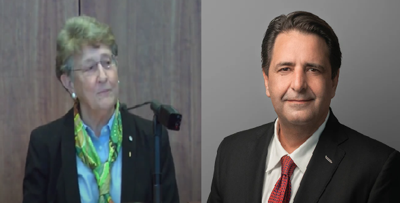
Jean Toal, left, and Peter Protopapas
PHILADELPHIA – A South Carolina lawyer won’t get to block the bankruptcy of a New Jersey company he was controversially appointed to take control of.
The U.S. Court of Appeals for the Third Circuit yesterday refused to dismiss the bankruptcy of Whittaker Clark & Daniels, a talc supplier caught in the latest wave of asbestos allegations. Around 2,700 lawsuits filed against WCD alleged the talc it supplied to companies for cosmetic products contained asbestos, sending the company to bankruptcy court to try to resolve its liabilities.
But in South Carolina, former Supreme Court justice Jean Toal appoints Columbia lawyer Peter Protopapas as a “receiver” over usually long-defunct companies, essentially giving him the power to act in the name of the business in order to sue its former insurers over decades-old policies.
He takes settlement money from insurers and places it in secret Delaware funds from which he takes his contingency fee and uses some of what’s left to compensate asbestos claimants.
WCD was dragged into this arrangement – the subject of several legal challenges and criticism from outside groups – when Sarah Plant won a $29 million verdict against it in South Carolina. She asked Toal to appoint Protopapas as a receiver for WCD, and Toal agreed. But a New Jersey federal court handling the subsequent bankruptcy said nothing in South Carolina law authorizes a court there to overrule the board of directors of WCD.
On appeal, Protopapas said the board couldn’t place the company in bankruptcy because Toal had given him the power to make decisions for it. The Third Circuit said for him to have that authority, he would’ve had to have been appointed by a judge in WCD’s home state – New Jersey.
“So it is no surprise that the Constitution limits the authority a state court can exercise over a corporation incorporated in a sister state,” Judge Thomas Ambro wrote. “Those limitations are as intuitive as they make good sense.
“A corporation’s state of incorporation or principal place of business determines its domicile. And domicile has long carried with it great significance for states’ authority.”
Earlier this year, the South Carolina Supreme Court affirmed Protopapas’ receivership over a Canadian company, Atlas Turner, but warned that he should only get that power in extraordinary circumstances.
A U.K. company has been fighting a similar appointment. Protopapas is acting as receiver of Cape Plc, suing companies it was possibly associated with through the years, like South African mining giants Anglo American and De Beers.
Those entities have fought the receivership both in South Carolina and abroad. A U.K. court ordered Protopapas to pay more than $1 million for taking control of Cape, a solvent company. That court threatened criminal penalties if he keeps it up, but the South Carolina Supreme Court called the injunction “shocking and indefensible.”
Altrad Group, caught up in the Cape receivership, has already filed the Third Circuit’s decision on file in the South Carolina Supreme Court.
“(T)he Third Circuit held that even if this Court attempted to vest a receiver with decision-making authority for the company targeted by a receivership order, such efforts would violate the United States Constitution – including the Commerce Clause and the Due Process Clause, precisely as the Altrad defendants and others have repeatedly pointed out in this litigation and in other receivership litigation before this Court,” it wrote.






